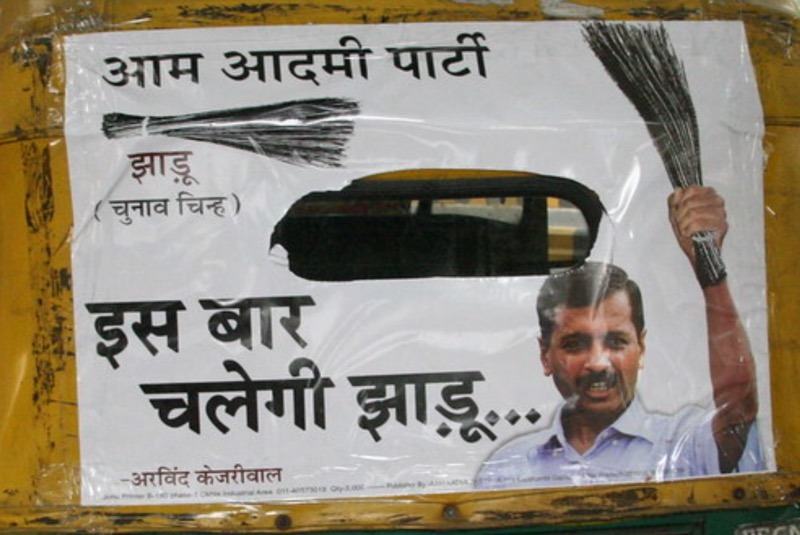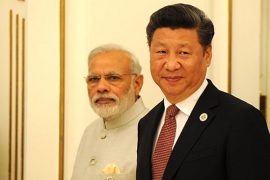My short association with the Aam Aadmi Party (AAP) was a bit of a misadventure. It seemed all right at that time to move, almost drift, from a social movement into a political one. In fact, the transition from a civil rights movement into a political party was a big jump. In retrospect, my association with AAP turned out to be a journey to nowhere.
The Right to Information (RTI) movement had, over time, turned into a large public outcry against corruption in government. In 2011, at Arvind’s initiative, Anna Hazare came to Delhi to lead the fight against corruption. The target of this movement was the ruling Congress Party. Silently, almost clandestinely, the opposition BJP (Bharatiya Janata Party) succeeded in including some of its front cultural organisations as participants in the movement.
A representative of Sri Sri Ravi Shankar’s ‘Art of Living’ foundation became a permanent feature of the leading group around Anna Hazare. In a misguided move, the government arrested Anna Hazare and Arvind Kejriwal on the day that Anna was to begin his indefinite fast to press the government to legislate a Lokpal Bill (an ombudsman to look into complaints against the government). The arrest brought the entire media and public focus together on the issue of Lokpal.
Activists like Medha Patkar (of the ‘Narmada Bachao Andolan’) and Rajendra Singh (also known as ‘Water Gandhi’ for having revived dry water bodies and rivers) joined the call for a Lokpal Bill. With each passing day, as septuagenarian Anna became weaker while fasting in public view, support for the movement swelled among the public and the media, with several film stars arriving in Delhi to show their solidarity. Finally, the government succumbed and agreed to talks with Anna and his team on drafting a Lokpal Bill. The chief organiser of the massive Lokpal agitation was Arvind.
Along with Anna Hazare, he became a prominent public figure. On the strength of this success, he decided to form a political party. Anna Hazare was not willing to move from activism to politics. The Right-wing BJP, which had supported the anti-corruption and Lokpal Bill movement, was very much against the formation of what emerged as the Aam Aadmi Party, and put up a resistance to it. However, Arvind Kejriwal and his close associates, Prashant Bhushan and Yogendra Yadav, wanted to strike while the iron was hot. They swiftly moved towards the creation of this new political party on the high tide of success of the anti-corruption Lokpal movement.
Why did I decide to become a founding member of AAP and why was I disillusioned by it just as the party moved towards unprecedented success—won elections and set up a government in Delhi?
It is an undisputed fact that corruption has its roots in the funding of political parties. Money that is given to them is unaccounted for (it is largely this money which has illegally avoided the tax net) and is called black money. The AAP came up promising transparency in political funding. It said that donations to the party would be accepted only through cheque payments, and that the party would display on its website every donation that it received, along with the name of the donor.
Like the RTI, this appeared to be a step in the right direction. If political party funding was to become transparent, the power of money in policy-making would also become transparent. No political party before AAP had proposed transparency in fund-raising. It was a ‘first time’ promise. It stirred my enthusiasm sufficiently for me to join AAP at its formation stage.
The AAP also promised in its Vision Document that tickets to contest elections would be given to candidates chosen by its grassroots workers/volunteers. These two promises were to distinguish it from all other political parties. A third element that it advertised was that it would abandon the VIP culture. It promised that elected leaders of AAP would live modestly.
In the very first elections it contested for the Delhi Assembly, AAP gave tickets to rejected candidates of the Congress and the BJP, who came with money for their campaigns and also for the party. In some cases, it did so after forcing candidates who had already been fielded with the support of the party’s volunteers to withdraw their candidatures in favour of the newcomers.
I was dismayed to hear that one of the dedicated AAP members whom I knew from the RTI days had been forced to withdraw her candidature for a newcomer who had been rejected by the Congress party. When I asked Yogendra Yadav about this contradiction with the Vision Document which he had drafted, he politely told me that Arvind was the ‘flagship’ of the party; therefore, we should not dispute party tickets given at his discretion.
Once it was formed, the party did not call any meeting to discuss political or social issues. Arvind asked me to write a policy paper on issues of foreign policy for the party’s election manifesto. I told him that since I did not know the policies of the party, I was not in a position to write about them; he replied that the party would stand by my personal views, whatever they were. This was not a joke. He actually meant it! The same was repeated on the issue of gender justice.
I remember that in the first and only meeting that I attended on writing the party’s manifesto, which was headed by Yogendra Yadav. Yadav told me, in response to my question about what the party’s ideology was, that it was to tackle every issue and problem, as and when we confront it. In short, it stood for no principles other than the principle of convenience or opportunism. Can a political party do without an ideology, and survive on nothing more than a call for fighting corruption?
As elections approached, tickets were distributed on the principle of convenience, which included how much money a candidate would bring. During election campaigns, khap panchayat chiefs who were known for having ordered the honour killings of young couples were invited to address the party’s rallies in Haryana.
Anyone who objected to this was told that khap panchayats have culturally strong roots, and are important and traditional organisations that should be given due respect. It is no secret that upper castes, money, and muscle power are in control of khap panchayats. None of these issues—caste, money, and muscle power—was ever discussed among party members. There was no need for discussion. All decisions emanated from the undisputed leader of the party.
When Arvind took oath as Chief Minister of Delhi in front of a sea of supporters, he sang, impromptu, a Hindi film song on ‘fraternal feelings or brotherhood’ (bhaichara, in Hindi), and seemed to win the hearts of the vast audience before him. He would also ask his audiences to take an oath to neither pay bribes nor accept them.
Corruption, to Arvind, meant the illegal transfer of notes from one hand to another. The question of corruption in policy-making was never raised; it was not even considered corruption. Insiders like myself found out only too soon that the party that was architected to fight corruption was diverging from that vital objective. AAP did not allow RTI to cover it. It still refuses to do so.
The question arises: Can a political party survive only on an anti-corruption plank? If anything, AAP is proof of this inadequacy. The promises to abandon VIP culture also seemed to vanish as soon as the Chief Minister and his cabinet colleagues moved into their official residences.
Just a fortnight after the first AAP government was formed, on the intervening night of 15–16 January 2014, Somnath Bharti, a minister in the Kejriwal government, along with a mob of supporters, raided the homes of Ugandan and Nigerian women living in Khirki Extension, a part of his constituency in South Delhi, in the dead of night.
The raid was conducted on the mere suspicion that the women were drug addicts and prostitutes. The young women were allegedly beaten, molested, dragged out, humiliated, and forcibly taken to the All India Institute of Medical Sciences (AIIMS), where they were subjected to narcotic tests. All of this was captured, including the objections raised by police officers who were called to the location of the raids, on video cameras by the minister’s cronies to be publically displayed as the party’s achievement.
The drug tests showed that the women victims of the raid had not taken narcotic drugs. The minister’s actions in raiding, humiliating, and forcibly subjecting the women to undergo tests were illegal, and the police officers present had objected to them. The entire late-night drama, where the Aam Aadmi Party’s minister and supporters had acted as vigilantes, clearly showed up their racism.
Where was the question of ‘fraternity and brotherhood’ for African women? They were helpless, few in number, and were not eligible to vote in elections. They were at the mercy of the vigilante workers of the AAP, which was running the government in Delhi. My criticism of this in the media and within the party elicited no response from the AAP leadership. I wanted to raise the issue in the first general body meeting of the party, which was held just fifteen days later, and proposed that a resolution should be passed, with the consent of the members, offering an apology to the African women who had been humiliated. It should also confirm that AAP was not a racist party. I circulated a draft resolution well in advance of the meeting.
At the meeting, I had hardly spoken three sentences on the subject when Yogendra Yadav, who was presiding over the meeting, snatched the microphone from me and warned me to not ‘make a spectacle before the media’. There was no media present. I was heckled and physically forced by party goons to step down and make myself scarce.
All this transpired before 250–300 party members, including Admiral (Retired) Ramdas, who was the Lokpal of the party, its moral guardian. Not a single voice of dissent was allowed to be raised.
Absolute loyalty to the party and its leadership was mandatory. That I was allowed to speak even a few sentences was because Admiral Ramdas had firmly stated that he would give his concluding address only after I was given a chance to speak. He had approved of the text of the resolution I had circulated in advance and intended to propose at the meeting. It was clear not only to me, but also to all the disciplined and loyal members of the party who were present that I was in the wrong place and in the wrong party. Interestingly, I received many telephone calls from party members who were witness to the drama and who voiced their solidarity with me. Some of them, including Admiral Ramdas and his wife, even took the trouble to visit me the next day.
Amit (my husband) had told me right in the beginning that he did not think my association with the party would last longer than a year at most. As it turned out, that journey to nowhere, which is how I can describe my association with AAP, was indeed very short-lived.
-30-
Copyright©Madras Courier, All Rights Reserved. You may share using our article tools. Please don't cut articles from madrascourier.com and redistribute by email, post to the web, mobile phone or social media.Please send in your feed back and comments to [email protected]











